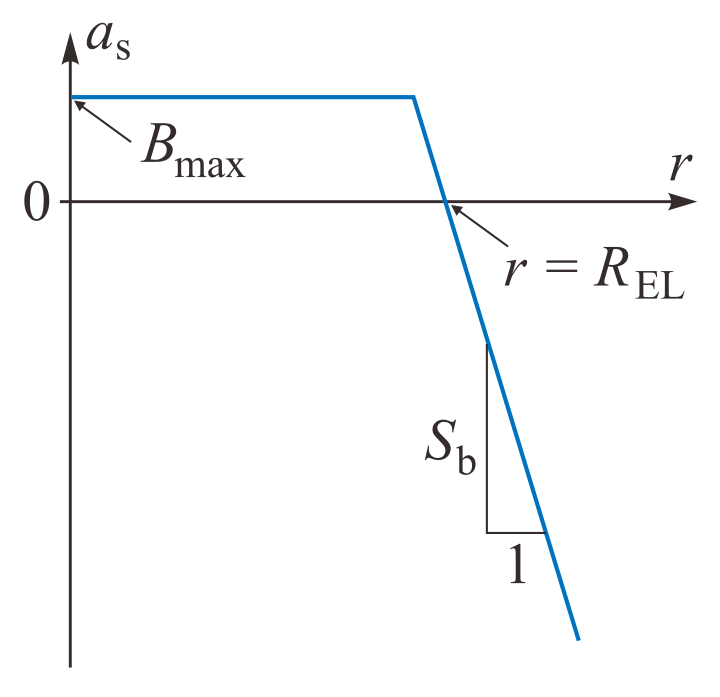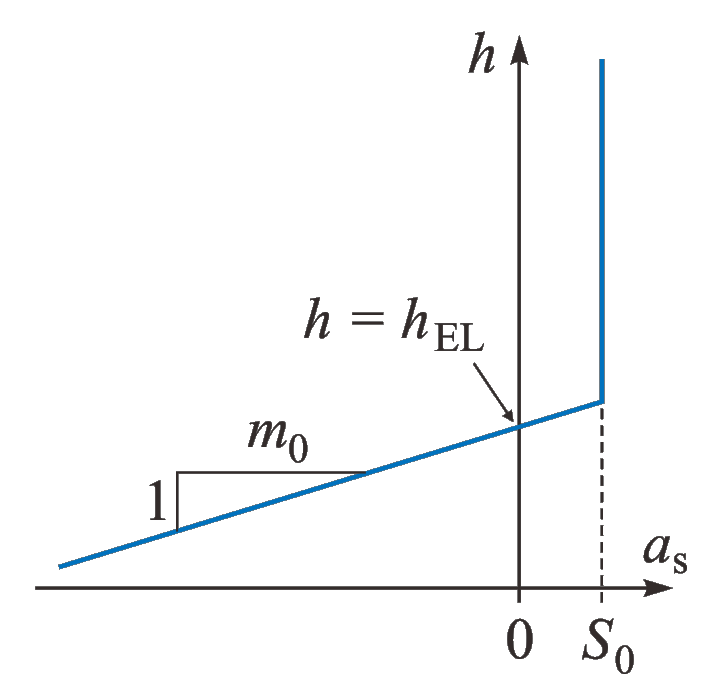7.1. Atmospheric forcing¶
Atmospheric forcing consists of the surface temperature and surface mass balance (SMB). Both must be provided for the simulated ice sheet as functions of space and time.
Note that, as mentioned in the “Ice thermodynamics” section, the surface temperature is capped at a maximum value of \(-0.001^\circ\mathrm{C}\) to avoid the presence of a temperate ice surface.
7.1.1. EISMINT¶
For the EISMINT (simplified geometry) domain, the surface temperature and SMB are specified by simple parameterizations. These parameterizations depend either on the horizontal distance from the centre of the domain, \(r\), or on the surface elevation, \(h\).
The distance-dependent parameterizations (parameter SURFACE_FORCING = 1) are those from the original EISMINT set-up by Payne et al. [51]. The surface temperature, \(T_\mathrm{s}\), is given by
where \(T_\mathrm{min}\) is the minimum temperature and \(S_\mathrm{T}\) the gradient of surface-temperature change with distance. The SMB, \(a_\mathrm{s}\), is also made a function of \(r\),
where \(B_\mathrm{max}\) is the maximum SMB, \(S_\mathrm{b}\) the gradient of SMB change with horizontal distance and \(R_\mathrm{EL}\) the distance of the equilibrium line from the centre of the domain (Fig. 7.1).

Fig. 7.1 Parameterization of the SMB, \(a_\mathrm{s}\), as a function of the horizontal distance from the domain centre, \(r\). The three parameters are the maximum SMB, \(B_\mathrm{max}\), the gradient of SMB change with horizontal distance, \(S_\mathrm{b}\), and the equilibrium line distance, \(R_\mathrm{EL}\).¶
In the run-specs headers, the parameters to be defined are
TEMP_MIN(\(=T_\mathrm{min}\), in degC),S_T(\(=S_\mathrm{T}\), in K/km),B_MAX(\(=B_\mathrm{max}\), in m/a),S_B(\(=S_\mathrm{b}\), in m/(a*km)),ELD(\(=R_\mathrm{EL}\), in km).
The more realistic elevation-dependent parameterizations (SURFACE_FORCING = 2) are by Greve and Blatter [30] (their Section 5.7.4). The surface temperature, \(T_\mathrm{s}\), follows the linear relationship
where \(T_\mathrm{sl}\) is the surface temperature at elevation \(h=0\) (“sea level”) and \(\gamma\) the atmospheric lapse rate. The SMB, \(a_\mathrm{s}\), is parameterized by
where \(S_0\) is the snowfall rate, \(m_0\) the melting gradient and \(h_\mathrm{EL}\) the equilibrium-line altitude (Fig. 7.2).

Fig. 7.2 Parameterization of the SMB, \(a_\mathrm{s}\), as a function of the surface elevation, \(h\). The three parameters are the snowfall rate, \(S_0\), the melting gradient, \(m_0\), and the equilibrium line altitude, \(h_\mathrm{EL}\).¶
In the run-specs headers, the parameters to be defined are
TEMP_0(\(=T_\mathrm{sl}\), in degC),GAMMA_T(\(=\gamma\), in K/km),S_0(\(=S_0\), in m/a),M_0(\(=m_0\), in m/(a*km)),ELA(\(=h_\mathrm{EL}\), in km).
Currently, it is not implemented to make the parameters of the above parameterizations time-dependent. (This feature can be added quite easily if need arises.) However, time-dependent anomalies of the surface temperature can be defined via the parameter TSURFACE and additional parameters, as described in the run-specs headers.
7.1.2. Antarctica, Greenland, etc.¶
For the terrestrial ice sheets and ice caps, the choice of the surface temperature and SMB is controlled by the run-specs-header paramaters TSURFACE, ACCSURFACE and ABLSURFACE, as well as further, dependent parameters. The following methods are available:
- For
TSURFACE,ACCSURFACE,ABLSURFACEall<= 5, the surface temperature and precipitation are prescribed via a present-day distribution plus time-dependent anomaly approach, while the runoff is parameterized by either the positive-degree-day (PDD) method (version by Calov and Greve [11]) or the linear-temperature-index (LTI) method (Ohmura [50]).The time dependency results either from a time-dependent surface temperature anomaly \(\Delta{}T_\mathrm{s}(t)\) (TSURFACEandACCSURFACE < 5), or from a time-dependent glacial index \(g(t)\) (TSURFACE = ACCSURFACE = 5). - For
TSURFACE = ACCSURFACE = ABLSURFACE = 6, the surface temperature and (net) SMB are prescribed, typically from GCM output. This is the method used for the ISMIP6 future predictions (Goelzer et al. [20], Seroussi et al. [56]) and follow-up studies. It requires present-day distributions plus annual anomalies for the surface temperature and SMB, all to be provided as NetCDF files. - The setting
ACCSURFACE = ABLSURFACE = 7selects the “implied SMB” by Calov et al. [10]. It has a similar effect as the settingTHK_EVOL = 3(topography nudging towards a prescribed target with a constant relaxation time; see Section “Ice-thickness evolution”).
For details on the different settings, see the documentation in the run-specs headers. Note that not all options are implemented for all domains.
7.1.3. North and south polar caps of Mars¶
For the north and south polar caps of Mars, the surface temperature and SMB are provided by a set of parameterizations called the Mars Atmosphere-Ice Coupler MAIC-1.5. It is driven directly by the orbital parameters obliquity, eccentricity and solar longitude of perihelion, to be provided as time-dependent values in an input file specified by the parameter INSOL_MA_90N_FILE (north polar cap) or INSOL_MA_90S_FILE (south polar cap). Further required parameter settings are TSURFACE = 6 and ACCSURFACE = 3.
The surface temperature is parameterized by the Local Insolation Temperature (LIT) scheme, which uses a daily and latitude-dependent radiation balance and includes a treatment of the seasonal CO2 cap (Greve et al. [35]). The SMB is parameterized by a distance-dependent equilibrium-line approach similar to Eq. (7.2) (Greve et al. [38], Greve and Mahajan [37]). For details, see the references and the documentation in the run-specs headers.